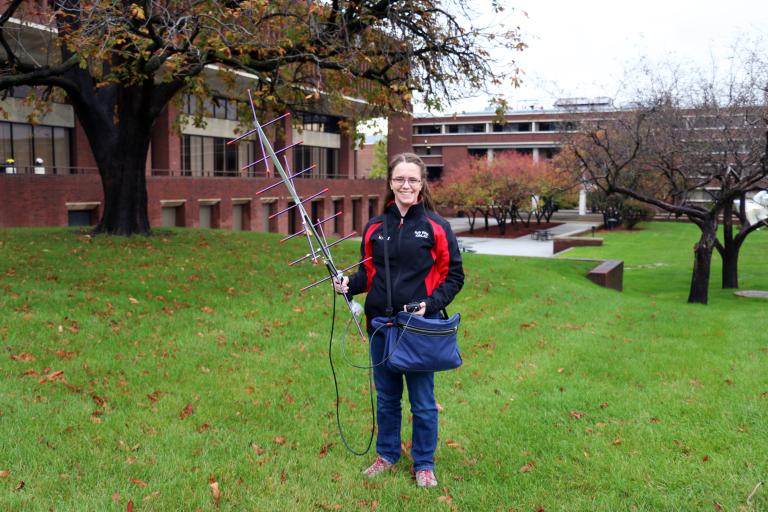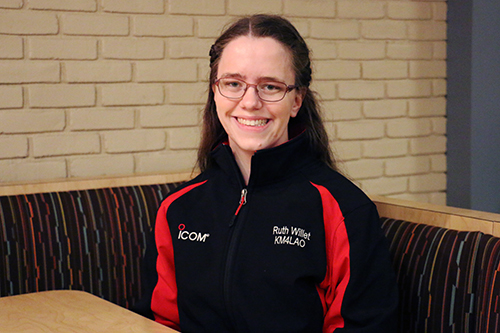
“I would encourage people to consider exploring amateur radio because it’s a hobby that allows you to explore anything from technical electronics to international friendships.”
Ruth Willet ‘21 has always been fascinated with Morse code, especially when researching World War II. That fascination grew into a hobby, and she soon found herself engrained in the amateur radio - more commonly known as ham radio - community.
Willet, who is double majoring in Mechanical Engineering and Engineering Physics, first got licensed in June 2015 as a ham radio operator because of her interest in Morse code. She soon upgraded her license in order to explore more aspects of the hobby.
Other hams know Willet as KM4LAO (Kilo Mike Four Lima Alpha Oscar), the call letters of her government-issued ham radio license.
“It’s such a special hobby because there’s so many people that want to get to know you and want to help you learn and grow. It really has enabled me to mature into who I am today. I have gained incredible friends from across the globe,” said Willet, a Georgia native. “This hobby supplements very well what I’m doing at Kettering because it has application in a lot of different subjects. I love seeing the practical application of electronics, solar weather and the way radio signals propagate around the globe. I am thrilled by the fact that I can talk to someone who’s driving down the interstate 10 miles away, bounce signals off of satellites to have conversations hundreds of miles away, or talk around the world to someone in Africa. It’s fascinating. You really learn a lot.”
Willet had to pass an exam given by the Federal Communications Commission (FCC) in order to receive her call sign and be allowed to operate on the air. The three levels of Amateur radio licenses from entry-level to most advanced are Technician, General, and Amateur Extra. Willet upgraded to the Amateur Extra level license before she graduated from high school.
Willet can use a hand-held radio to talk with someone across town, or she can use a more robust radio that enables her to talk around the world by reflecting her transmitted signal off the ionosphere. There are fast-paced competitive events she participates in where she is supposed to talk to as many people as possible within 24 hours. She can operate in multiple ways, including Morse code, voice communication or digital (which is similar to texting through ham radio). 
“The fun thing is that’s only the start. Amateur radio satellites are orbiting the earth. You can bounce off the satellites and talk to people halfway around the world,” Willet said. “We can also use our skills to assist in emergency situations. For example, when Hurricane Irma recently hit in Puerto Rico, amateur radio operators were some of the only people who could communicate from the island to the outside world.”
In 2016, Willet also participated in National Parks on the Air, a worldwide event organized by the American Radio Relay League. Since 2016 was the centennial of the National Park Service (NPS), hams wanted to help celebrate history by getting people to national parks, seashores, monuments, and more. Ham radio operators went out and set up portable radio stations, got on the air, and helped other hams around the world conduct “virtual visits” to parks across the country.
When Willet came to Kettering University, she knew she wanted to continue her ham radio activities. Kettering was appealing to her for the small classes and the close-knit campus feel, on top of the co-op experience.
“After coming for the LITE (Lives Improved Through Engineering) summer program and seeing how personal everybody was at Kettering I just really felt like it was a great fit. And I can’t turn down the co-op experience,” Willet said. “I was first interested in Mechanical Engineering because my grandfather had a book about basic machines and how they work. I was fascinated with levers to complicated gears. Then senior year of high school I took Physics and I loved it. Being able to see the effects of basic physics on daily life was very interesting to me. I’m learning as much as I can at school and exploring opportunities both inside and outside the classroom so that I can make the most of my time here.”
She has found that the skills she learns in classes go hand in hand with her amateur radio hobby. Willet plans to start up an Amateur Radio Club on campus in the spring 2018 term to get more students interested.
“It’s a stress relief for me. I really enjoy sharing this hobby with other students,” she said. “I would encourage people to consider exploring amateur radio because it’s a hobby that allows you to explore anything from technical electronics to international friendships. Amateur radio is open to anyone. It will help develop your professional and personal skills, participate in and learn from fascinating activities, and connect with an incredible community.”